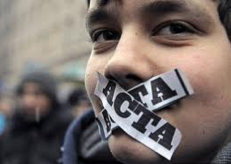 Source: NileBowie
Source: NileBowie
In the wake of a
public outcry against internet regulation bills such as SOPA and PIPA, representatives
of the EU have signed a new and far more threatening legislation yesterday in
Tokyo. Spearheaded by the governments of the United States and Japan and constructed
largely in the absence of public awareness, the measures of the Anti-Counterfeiting Trade
Agreement (ACTA) dramatically alter current international legal framework, while
introducing the first substantial processes of global internet governance. With
complete contempt towards the democratic process, the negotiations
of the treaty were exclusively held between industry representatives and
government officials, while excluding elected representatives and members
of the press from their hearings.
Under the guise of protecting intellectual
property rights, the treaty introduces measures that would allow the private sector
to enforce sweeping central authority over internet content. The ACTA abolishes
all legal oversight involving the removal of content and allows copyright
holders to force ISPs to remove material from the internet, something that
presently requires a court order. ISPs would then be faced with legal
liabilities if they chose not to remove content. Theoretically, personal
blogs can be removed for using company logos without permission or simply linking to copy written material; users could be
criminalized, barred from accessing the internet and even imprisoned for
sharing copyrighted material. Ultimately, these implications would be
starkly detrimental toward the internet as a medium for free speech.


